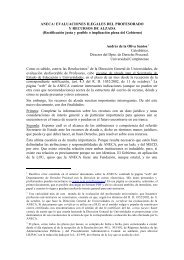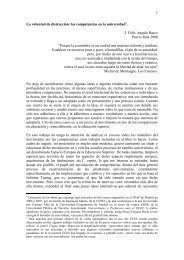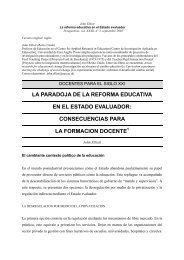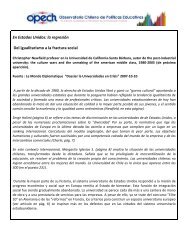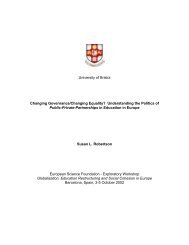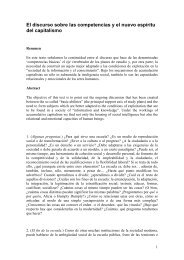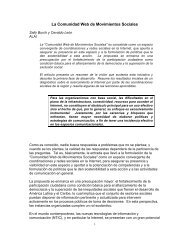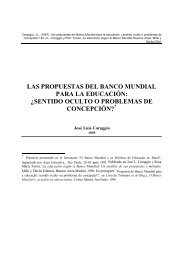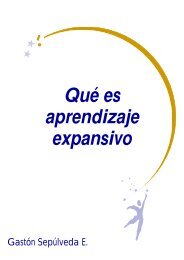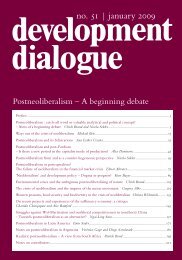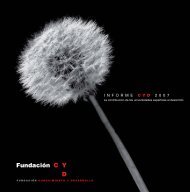Lifting the Burden: Law Student Debt as a Barrier to Public Service
Lifting the Burden: Law Student Debt as a Barrier to Public Service
Lifting the Burden: Law Student Debt as a Barrier to Public Service
You also want an ePaper? Increase the reach of your titles
YUMPU automatically turns print PDFs into web optimized ePapers that Google loves.
A recent Office of Personnel Management Report found that “[t]he student loanrepayment authority is a valuable <strong>to</strong>ol that enables agencies <strong>to</strong> entice potentialcandidates in<strong>to</strong> Federal service and keep talented employees in <strong>the</strong> Federalworkforce.” 87 The Report stated that <strong>the</strong> federal agencies identified lack of fundingfor <strong>the</strong> loan repayment program <strong>as</strong> <strong>the</strong> most common barrier <strong>to</strong> using <strong>the</strong> student loanrepayment incentive effectively. 88 The agencies recommended several changes in <strong>the</strong>Federal student loan repayment program, such <strong>as</strong> eliminating <strong>the</strong> tax liability <strong>to</strong>employees, reducing <strong>the</strong> statu<strong>to</strong>ry three-year service requirement in exchange forstudent loan repayment, and incre<strong>as</strong>ing <strong>the</strong> annual payment limitation and <strong>the</strong>lifetime maximum payment limitation on student loan repayment. 89 One Federalofficial noted that although <strong>the</strong> General Accounting Office offered student loanrepayments <strong>to</strong> 187 employees, nearly 10% rejected <strong>the</strong> offer due in part, <strong>to</strong> <strong>the</strong>additional tax burden that results from accepting <strong>the</strong> loan repayment. 90Making <strong>the</strong> student loan repayment benefit tax-free will greatly incre<strong>as</strong>e itsincentive potential. Fur<strong>the</strong>rmore, <strong>the</strong> ABA should support legislative efforts <strong>to</strong> review<strong>the</strong> annual and aggregate caps so that <strong>the</strong>y keep pace with rising educational costs.45Congress should amend <strong>the</strong> Internal Revenue Code <strong>to</strong> allow a full deduction forinterest paid on student loans obtained for <strong>the</strong> purpose of attending an institutionof post-secondary education.Borrowers who paid interest on a student loan may be able <strong>to</strong> deduct up <strong>to</strong> $2,500of <strong>the</strong> interest paid. This deduction is taken <strong>as</strong> an adjustment <strong>to</strong> income, so aborrower can claim it even if she does not itemize deductions. The amount of aborrower’s deduction depends upon his income level. If an individual’s modifiedadjusted gross income exceeds $65,000 (or $130,000 for a borrower filing a jointreturn), she may not take a student loan interest deduction.Congress should amend <strong>the</strong> Internal Revenue Code <strong>to</strong> allow a full deduction forinterest paid on student loans obtained for attending an institution of post-secondaryeducation, such <strong>as</strong> law school. With <strong>the</strong> cost of law school tuition rising, law studentsare borrowing more funds <strong>to</strong> finance <strong>the</strong>ir legal educations. With many law studentsborrowing $80,000 or more in loans, graduates are faced with monthly loan obligationsin excess of $1,000 (this figure may not include loans <strong>as</strong>sumed <strong>to</strong> finance undergraduateand/or o<strong>the</strong>r graduate education). Especially in <strong>the</strong> years immediately followinggraduation, law students may pay in excess of $10,000 of interest on law school loans.By res<strong>to</strong>ring <strong>the</strong> full deductibility of student interest loan payments, Congresscould help borrowers reduce <strong>the</strong> actual cost of repaying money borrowed for lawschool. This res<strong>to</strong>ration will provide a strong incentive for law graduates <strong>to</strong> acceptlower-paying public service jobs by reducing <strong>the</strong>ir taxable income.No legislation <strong>to</strong> res<strong>to</strong>re <strong>the</strong> full deduction is pending. However, on March 18,2003, Representative Miller (D-CA) introduced H.R. 1304, which proposes <strong>to</strong> change<strong>the</strong> current student loan tax deduction benefit <strong>to</strong> a tax credit, which will deliver alarger rebate on <strong>the</strong> interest paid on student loans <strong>to</strong> borrowers than is affordedunder current law.Federal87OPM Report <strong>to</strong> Congress on <strong>the</strong> Federal <strong>Student</strong> Loan Repayment Program, supra note 45, 7.88Id. at 6.89Id. at 6.90Quote attributed <strong>to</strong> David Walker, Comptroller General, in “Few Agencies Repay <strong>Student</strong> Loan <strong>to</strong> Keep, HireStaff,” Federal Times, November 11, 2002.



